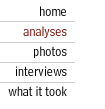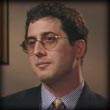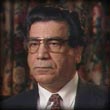 |  | 

 I think we were able to accomplish something that, even in retrospect, I'm
still amazed at. We were able to uncover a clandestine weapons program. Up
until that time -- realize that the record of arms control is really confirming
that people, who have no intention of cheating, are not cheating. The Belgians
aren't developing their clandestine nuclear weapons program -- oh, big
surprise! I think we were able to accomplish something that, even in retrospect, I'm
still amazed at. We were able to uncover a clandestine weapons program. Up
until that time -- realize that the record of arms control is really confirming
that people, who have no intention of cheating, are not cheating. The Belgians
aren't developing their clandestine nuclear weapons program -- oh, big
surprise!
Iraq was the case of actually being able to discover a program that the
opposition didn't want you to.
Secondly, we were able, for the first time, to use new tools of arms control.
And not just intelligence. Zero notice inspections did not involve
intelligence. It involved a change of policy and will of the international
community to allow inspectors to inspect without telling you in advance where
you were going. The standard I.A.E.A. inspection before the war, and one that
is still used today in most states: you're coming, inspectors are coming, six
months in advance. They have to apply for visas. They have to get airplane
flights. So, if you want to hide something, you have more than ample
opportunity. We pioneered new tools and new methods of doing it. And I think
that's terribly important over the long run.
But let me say, we did not fully understand the Iraqi program. The biological
program was far too difficult for inspectors to find and really was not
uncovered until the two son-in-laws defected.
Today, eight years after, they have not made what most people judge to be a
full and complete declaration of their prohibited materials. Second, it turned
out to be far more extensive.
In the nuclear area, for example, it turned out Iraq had spent over $10 billion
in the 1980s to develop a program that explored practically every known way to
enrich uranium, and to craft a nuclear weapon. This was not a small program.
It was one that was so extensive, that as an inspector, when you faced it, your
mind boggled. The largest team I ever took into Iraq was a team of 44
individuals, and we were expected to route out by ourselves this massive
program? That was a challenge.
And then, of course, Saddam survived, and it became quite clear early on into
the inspections, that this individual had no intent of giving up, not only his
nuclear program, but his biological, chemical and missile program. So you were
dealing with an actively hostile regime that was determined to frustrate the
international inspectors.

 Well, first of all, in the accomplishments category, besides just the mass of
what UNSCOM destroyed, if you look at it from an American policy point of view,
for eight years you get to switch off Iraq's national economy and have enormous
amounts of influence over its weapons program, both because Iraq is not able to
buy weapons from abroad; not able to build many of weapons because it's being
inspected. UNSCOM was a huge constraint on Iraq all these years. Well, first of all, in the accomplishments category, besides just the mass of
what UNSCOM destroyed, if you look at it from an American policy point of view,
for eight years you get to switch off Iraq's national economy and have enormous
amounts of influence over its weapons program, both because Iraq is not able to
buy weapons from abroad; not able to build many of weapons because it's being
inspected. UNSCOM was a huge constraint on Iraq all these years.
If you have a hostile power that you want to keep a lid on, you don't get many
better deals than UNSCOM these past eight years. And it's coming to an end.
[UNSCOM was] being asked to remove special weapons from Iraq that, as it turned
out, Saddam Hussein considered to be at the very heart of his country's
strategic interests, to hold on to.
There's no doubt that UNSCOM has had huge accomplishments. They have
destroyed, as they often say, and it's absolutely true, far more of Iraq's
special weapons than the whole Persian Gulf War did, even though those special
weapons were one of 12 major targets that the American-led Allied Forces
bombed. So, they've gotten rid of enormous quantities of chemical munitions,
of gravity bombs, of missiles, of production facilities, and so on.
They have not been able to satisfy themselves that they've destroyed Iraq's
most sophisticated and dangerous weapons. For example, in the chemical field,
VX, the world's most lethal nerve gas. In the biological field, they're very
much unsatisfied with what they know. And there are certain nagging doubts on
the nuclear side and the missile side as well.

UNSCOM did a fantastic job. You have to understand that when the Gulf War was
ended there was revealed an awesome array of weapons of mass destruction:
almost a nuclear bomb, long-range missiles, chemical, biological, all of the
weapons of mass destruction. And we, with Iraq, got hold of most of it, got an
account of it or got rid of it.

 Both UNSCOM and IAEA organizations initially worked the same and achieved a
great deal, ... destroying most of ... what they knew existed, what were
allowed or seen by them. There were some confrontations along the way. Both UNSCOM and IAEA organizations initially worked the same and achieved a
great deal, ... destroying most of ... what they knew existed, what were
allowed or seen by them. There were some confrontations along the way.
Iraq fears most the losing of the scientists -- more than equipment. Equipment
are replaceable. Scientists are not. These are highly trained people,
experienced, and what's going on with Iraq now, nobody is coming back in.
People who left with scholarships, who trained in the West, very few of them
are coming back in. Iraq is losing its capabilities. It lost most of its
university and high-level cadres , most of its doctors, the good ones ... and
such.
... They can't travel, their families cannot leave the country, they are under
strict surveillance. Saddam evaluated this more or less correctly, that
equipment he can buy, destruction of buildings, there's nothing cheaper than
cement in Iraq, OK? Basic material on buildings available, equipment can be
purchased or smuggled in -- and he has a huge smuggling operation. And so,
what he cannot replace is a scientist who leaves.
UNSCOM started becoming aggressive in that direction, too, and the action team.
Which is good. And I sense this is the real disarmament, is removing the
people who can reconstitute the programs. And the problems are started more on
that direction.
So, the full range of the weapon industry in Iraq, the proscribed ... industry,
became better known and better understood. But the capabilities are still
there.

I think at the beginning, there was a certain degree of skepticism. The idea
that some U.N.-like organization was going to actually accomplish a great deal.
A lot of us had watched things like the International Atomic Energy Agency for
decades, and it had always worked on a voluntarily or consensual basis. And
quite honestly, I didn't have a lot of faith in the I.A.E.A. It was only
allowed to look where government said it could look. So the idea that UNSCOM,
the U.N. Special Commission, was going to come along and do something very
different -- possible, but quite honestly, I admit to being skeptical at the
time. Glad I was proved wrong.
...The Iraqis were clearly hanging tough. They were resisting every inch of
the way. So very clearly, they still had stuff they wanted to hide. That
became obvious.
The good news though, is that UNSCOM was not rolling over and playing dead,
that UNSCOM was proving to be extraordinarily tough, and Rolf Ekeus, the person
who was running it, turned out to be a hero. Here was somebody who was
actually opposite to what most Americans would say is an international civil
servant. Here's a guy who spoke the truth, who was tough, was direct, and
said, "Look, I've got a job to do. I'm going to do it." He was so
unexpectedly direct, and you almost might say, politically incorrect for
someone out of an international organization that we were just as pleased as
could be. And also, the team members were hanging tough, people like David Kay
and others. What they did was heroic. ...

You have to recall that Iraq admitted only holding chemical weapons, in the
beginning, and some missiles. They denied completely the existence of
biological weapons. They completely denied the existence of nuclear weapons.
What the inspectors and UNSCOM managed to do was to find and identify these
large programs of nuclear and biological [weapons]. But the inspectors also
identified the chemical weapons program, to a much larger extent than Iraq
admitted. And then, the missiles, in a sense, the same.
That was one part of the job. The other part was to supervise the destruction
and destroy Iraq's weapons.
I would say, spectacular was the destruction of production facilities, of the
big laboratories and the machines, test sites and so on, which were done over
the period. So, I think that was quite a remarkable performance by our
inspectors.

home +
experts' analyses +
photos +
interviews +
what it took +
join the discussion
readings & links +
chronology +
synopsis +
tapes & transcripts
frontline +
pbs online +
wgbh
web site copyright WGBH educational foundation
 |  |